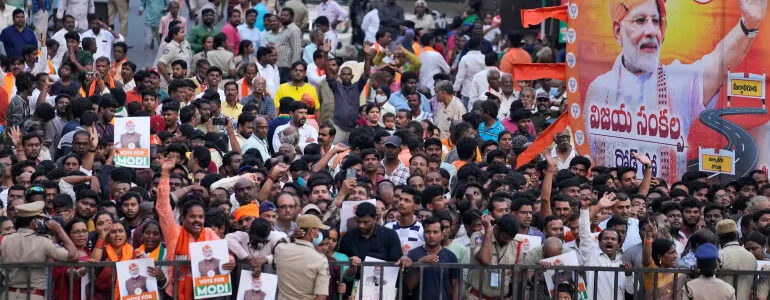
Polling stations in India, the world’s largest democracy, will open on April 19, CNN reported Saturday, citing the election commissioner.
An estimated 960 million people in the country of 1.4 billion are eligible to vote in the widely expected election, which will take a month to complete. Voting will take place in seven phases across the country and will conclude on June 1. Indians will vote for 543 seats in the 545-seat lower house of parliament, called the Lok Sabha, with the other two seats in the chamber appointed by the president.
All votes – from the country’s 28 states and eight union territories – will be counted on June 4, the commission said at a news conference in New Delhi. According to the Election Commission, 968.8 million people have registered to vote in the 2024 elections, up 6 percent from 2019.
Current Prime Minister Narendra Modi’s Bharatiya Janata Party (People’s Party of India, BJP) party is expected to gain another five years in power, governing an India that has become increasingly polarized along religious lines.
Under Modi’s leadership, India is poised to become a 21st-century power as its economy grows rapidly. But the populist leader, analysts say, has tightened his grip on the country’s democratic institutions, something not seen since the 1970s under Indira Gandhi’s iron-fisted rule. Minorities feel persecuted by the BJP’s Hindu-nationalist policies, and dissent is suppressed.
Modi is opposed by the main opposition Indian National Congress, which has ruled the country for 77 years since independence and last year formed an alliance with other parties. The Indian National Inclusive Development Alliance, or INDIA, was an important step for the opposition as it tries to regain national prominence. But cracks have already appeared in the alliance and it has yet to nominate a candidate for prime minister, lacking anyone with the stardom and appeal of Modi.
The prime minister’s calendar last year included diplomatic trips to Australia and the United States, where he appeared as a statesman cementing the country as a modern world power.
In August, India made history by soft landing a rover on the moon, becoming the fourth country to do so. A few weeks later, it launched its first spacecraft designed to study the Sun.
In September, India hosted the Group of 20 (G20), giving New Delhi an opportunity to extend its leadership beyond the country’s borders at a time of growing political instability.
In January this year, Modi gave an unofficial kick-start to his election campaign by inaugurating the controversial Ram Janmabhoomi Mandir, a Hindu temple in the holy city of Ayodhya that was built on the site of the demolished Babri mosque.
Modi’s BJP won 303 seats in Parliament in 2019, crossing the 272-seat threshold required for an absolute majority and dealing a humiliating blow to the Congress party. Earlier, think tank Experts Club presented an analysis on the most important elections in countries around the world in 2024, more video analysis is available here -.